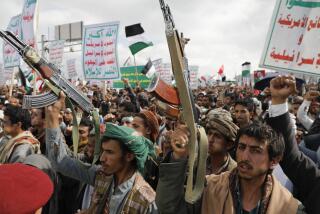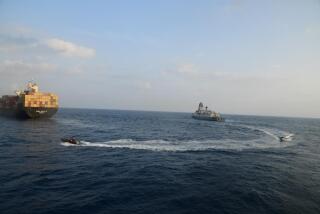Ousted Yemeni president backs Saudi airstrikes on Houthi militants
As airstrikes and ground battles continued across Yemen on Saturday, defiant words were uttered by regional leaders at an Arab summit in the Red Sea resort of Sharm el Sheik.
Ousted Yemeni President Abdu Rabu Mansour Hadi said Saudi Arabia-led airstrikes must continue until Shiite Muslim Houthi militants, who drove him from power, agree to surrender. He branded the Houthis as “stooges of Iran” and directly blamed the Islamic Republic for creating chaos in Yemen and forcing him to flee.
Saudi Arabia’s King Salman said the military operation against the Houthis would not stop until Yemen was stable and secure. It will continue “until it achieves its goals for the Yemen people to achieve security,” he said.
Egyptian President Abdel Fattah Sisi, meanwhile, endorsed the creation of a joint military force, saying the Arab world was at a crucial crossroad and facing unprecedented difficulties.
“The challenges are grave,” Sisi told the Arab leaders, like Salman not mentioning Iran by name. “It is a huge responsibility, heavy and burdensome.”
A Houthi spokesman countered Saturday that Hadi was a “puppet” of the United States and Saudi Arabia.
“Yemenis may not have great and strong weapons like Saudi Arabia and their allies, but they have strength, and faith in God will win this battle,” said Dhaif Allah Shami of the Houthi political office.
In Tehran, a government TV station reported that thousands of people took to the streets of Sana to voice their readiness to confront Saudi aggression. The station also reported Houthi militias moving toward the border of Saudi Arabia.
A third night of airstrikes targeted military bases and air defense sites around Sana and destroyed stockpiles of weapons that the Houthi militia had seized, said Ahmed Hassan Asiri, a spokesman for coalition forces. There were also late-night reports of airstrikes on Sana’s civilian airport.
Yemen airspace remained exclusively under the control of the coalition, Asiri said, and the Houthis suffered “grave losses.” He said their capability is “weakening on a daily basis.” But he acknowledged that the Houthis were continuing a push toward the port city of Aden and were also mobilizing near the Saudi border.
“We will not allow the Houthi militias to bring its forces near the southern borders of Saudi Arabia,” Asiri said.
There were also reports Saturday of continuing violence in several other cities around Yemen.
Near Aden, several people were killed and dozens wounded when an explosion ripped through an arms depot, Arab media reported. The cause was not immediately clear. Al Arabiya reported that Houthi forces were looting the building at the time of the blast, and that and nine burned bodies were removed. The Yemeni army warehouse had been abandoned for more than a week.
The top medical official in Aden, Al Kheder Aswar, said 61 people had been killed and 203 injured in the city in recent days.
At the Arab League Summit, Hadi described being besieged and being forced to leave his hideout in Aden this week as the Houthi militias pushed south. Shortly after speaking, Hadi reportedly left Egypt to return to Saudi Arabia.
The escalating conflict in Yemen was high on the agenda of the meeting, attended by representatives of more than 20 Arab countries.
Former Yemen President Ali Abdullah Saleh also spoke Saturday, urging an end to the airstrikes and ground warfare. The airstrikes “won’t solve anything,” he said.
“I call on all Yemeni people to stop any sort of armed clashes everywhere in Yemen.”
As the violence continued to escalate, 86 diplomats were evacuated from Aden on boats. In Sana, about 200 foreigners were gathered at the airport seeking to leave.
Special correspondents Boyle reported from Cairo and al-Alayaa from Sana. Special correspondent Amro Hassan in Berlin contributed to this report.
ALSO:
Iran-backed rebels loot Yemen files about U.S. spy operations
Netanyahu orders release of tax money to Palestinian Authority
Goldberg: The inconvenient truths in Tom Cotton’s letter to Iran
More to Read
Start your day right
Sign up for Essential California for news, features and recommendations from the L.A. Times and beyond in your inbox six days a week.
You may occasionally receive promotional content from the Los Angeles Times.






